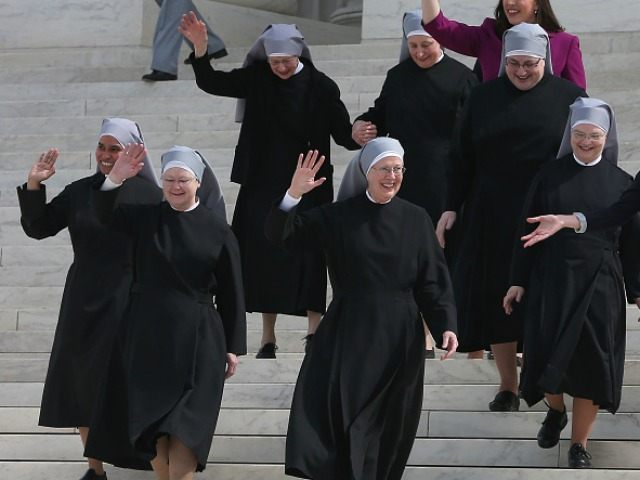Perhaps the most appropriate axiom applicable to American courts today is not a legal phrase, but a political one.
“Personnel is policy.”
It’s a maxim that gained popularity in the early Eighties and refers to a president’s political appointees. It means that the direction of a president’s administration is largely determined by whom he or she picks to direct various governmental offices. A president will typically select people to run federal departments and agencies who will advance his political agenda.
While “personnel is policy” was meant to apply to the executive branch, today it also describes the judicial. You could say that “personnel is policy” now has a corollary for the bench – “personnel is jurisprudence.”
Nowhere is this development better illustrated than in the soon-to-be-decided Supreme Court case Priests for Life vs. HHS. Last November, this case — which is my organization’s challenge to the HHS mandate — was accepted by the Supreme Court along with six other similar cases which the Court consolidated into Zubik vs. Burwell. We had filed one of the first lawsuits against the HHS mandate over four years ago.
The subject of the lawsuits, the HHS mandate, is a regulation issued by bureaucrats as part of Obamacare. It requires some religious non-profit groups, such as Priests for Life, Catholic University of America, and East Texas Baptist University, and dozens of others, to be complicit in making available to our employees drugs and devices that can cause abortion. For us to obey this government edict, we would have to disobey the teachings of our faith. And if we refuse to place the administration above God, we will be levied debilitating fines.
The result of this threat from the government has been not just the seven legal challenges now before the Supreme Court, but also dozens of others filed nationwide. Catholic dioceses, religious charities, universities and individuals are arguing that the Obama administration’s actions violate rights protected by the Religious Freedom Restoration Act.
Before reaching the Supreme Court, though, Priests for Life vs. HHS and the six other cases were, of course, heard in federal Circuit Courts of Appeal. In all seven of those instances, the appeals courts voted in favor of the Obama administration’s position. A total of 12 appeals court judges were involved in those decisions – ten appointed by Democratic presidents (four by President Obama); two by Republicans.
Conversely, there has been only one HHS mandate lawsuit that has resulted in a federal appeals court holding for religious non-profit groups and against the Obama administration. All three of the judges in that case were appointed by Republican presidents.
The evidence suggests a pattern.
Liberal presidents appoint judges who almost always, if not always, support their political agendas. Liberal jurists tend to view the Constitution as a “living, breathing document” — that is to say, changeable, and capable of being interpreted so broadly that it is rendered practically meaningless. Or they effectively rewrite legislation — whatever is necessary to achieve a political end.
Conservative presidents appoint judges who, more often than not, support their political agendas. Their record at naming like-minded jurists to the bench, however, is not nearly as consistent as that of their liberal counterparts. Suffice it to say, though,that in the last 40 years, virtually all – if not all – conservative, pro-life appeals court judges have been appointed by conservative presidents.
Which brings us back to the HHS mandate. It demonstrates the power of the presidency in two ways.
Only a liberal administration would even propose a regulation that would threaten religious non-profit groups with fines if we don’t violate our beliefs by providing abortifacients to our employees. The HHS mandate was not passed by Congress and was not required by law. It is entirely the work of Obama appointees in the Department of Health and Human Services who serve at the pleasure of the President.
In short, without a pro-abortion president, there would be no HHS mandate.
Further, even with the HHS mandate, without federal judges appointed by liberal presidents there would be no threat to religious liberty posed by the rule. If not for Carter, Clinton, and Obama appointees to the federal appellate bench,the mandate likely would have been struck down before cases against it ever reached the Supreme Court.
All of which makes the statement “personnel is jurisprudence” even more profoundly applicable.
Federal judges hold lifetime appointments. They can stay in their positions until they retire, die, or are removed from office for bad behavior. They far outlast the president who gave them their jobs. And if they are activist liberals who act as legislators, they can decide what our laws mean – or even rewrite them – for a long, long time.
Federal judges answer only to other federal judges. If they are Supreme Court justices, they answer to no one.
Indeed, personnel is policy. Which makes the election of the Appointer-in-Chief all the more important.

COMMENTS
Please let us know if you're having issues with commenting.